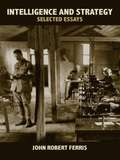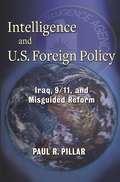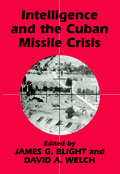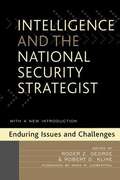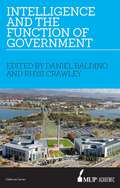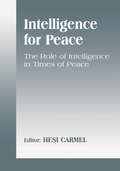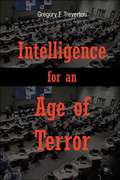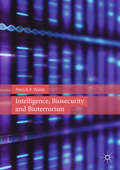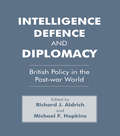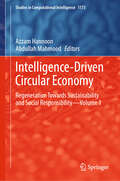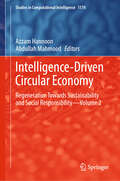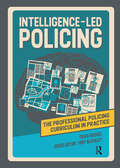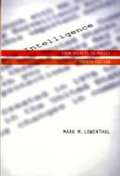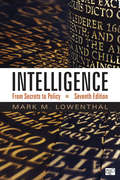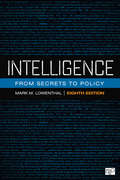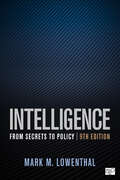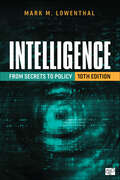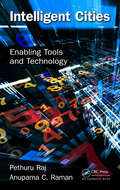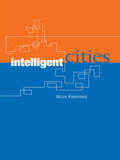- Table View
- List View
Intelligence and Strategy: Selected Essays (Studies in Intelligence)
by John FerrisJohn Ferris' work in strategic and intelligence history is widely praised for its originality and the breadth of its research. At last his major pioneering articles are now available in this one single volume. In Intelligence and Strategy these essential articles have been fundamentally revised to incorporate new evidence and information withheld by governments when they were first published. This volume reshapes the study of communications intelligence by tracing Britain's development of cipher machines providing the context to Ultra and Enigma, and by explaining how British and German signals intelligence shaped the desert war. The author also explains how intelligence affected British strategy and diplomacy from 1874 to 1940 and world diplomacy during the 1930s and the Second World War. Finally he traces the roots for contemporary intelligence, and analyzes intelligence and the RMA as well as the role of intelligence in the 2003 Gulf War.This volume ultimately brings new light to our understanding of the relations between intelligence, strategy and diplomacy between the end of the 19th century and the beginning of the 21st century.
Intelligence and U.S. Foreign Policy: Iraq, 9/11, and Misguided Reform
by Paul PillarA career of nearly three decades with the CIA and the National Intelligence Council showed Paul R. Pillar that intelligence reforms, especially measures enacted since 9/11, can be deeply misguided. They often miss the sources that underwrite failed policy and misperceive our ability to read outside influences. They also misconceive the intelligence-policy relationship and promote changes that weaken intelligence-gathering operations.In this book, Pillar confronts the intelligence myths Americans have come to rely on to explain national tragedies, including the belief that intelligence drives major national security decisions and can be fixed to avoid future failures. Pillar believes these assumptions waste critical resources and create harmful policies, diverting attention away from smarter reform, and they keep Americans from recognizing the limits of obtainable knowledge.Pillar revisits U.S. foreign policy during the Cold War and highlights the small role intelligence played in those decisions, and he demonstrates the negligible effect that America's most notorious intelligence failures had on U.S. policy and interests. He then reviews in detail the events of 9/11 and the 2003 invasion of Iraq, condemning the 9/11 commission and the George W. Bush administration for their portrayals of the role of intelligence. Pillar offers an original approach to better informing U.S. policy, which involves insulating intelligence management from politicization and reducing the politically appointed layer in the executive branch to combat slanted perceptions of foreign threats. Pillar concludes with principles for adapting foreign policy to inevitable uncertainties.
Intelligence and U.S. Foreign Policy: Iraq, 9/11, and Misguided Reform
by Paul R. PillarPaul R. Pillar's twenty-eight-year career with the CIA and the National Intelligence Council showed him that intelligence reforms, especially measures enacted since 9/11, can be deeply misguided. They often miss the sources underwriting failed policy and misperceive our ability to read outside forces. They misconceive the intelligence-policy relationship and promote changes that weaken intelligence-gathering operations. In this book, Pillar confronts the intelligence myths Americans have come to rely on to explain national tragedies, including the belief that intelligence drives major national security decisions and can be fixed to avoid future failures. These assumptions waste critical resources and create harmful policies, he claims, diverting attention away from smarter reform. They also refuse to recognize the limits of our knowledge. Pillar revisits U.S. foreign policy during the Cold War and highlights the small role intelligence played in those decisions, and he demonstrates the negligible effect America's most notorious intelligence failures had on U.S. policy and interests. He also reviews in detail the events of 9/11 and the 2003 invasion of Iraq, condemning the 9/11 commission and the George W. Bush administration for their portrayals of the role of intelligence. He offers an original approach to better informing U.S. policy, which involves insulating intelligence management from politicization and reducing the politically appointed layer in the executive branch that interjects slanted perceptions of foreign threats. Pillar concludes with principles for adapting foreign policy to inevitable uncertainty.
Intelligence and the Cuban Missile Crisis (Studies in Intelligence)
by James G. BlightThis is the first study to examine throughly the role of US, Soviet and Cuban Intelligence in the nuclear crisis of 1962 - the closest the world has come to Armageddon.
Intelligence and the National Security Strategist: Enduring Issues and Challenges
by Roger Z. George Robert D. KlineThis timely reissue of the 2004 edition (National Defense U. Press), with a new introduction by the assistant director of Central Intelligence for Analysis and Production, targets a broad audience. Based on a class at the National War College taught by the editors, this anthology of 39 previously published and new articles treats the evolution and structure of US intelligence and perspectives on controversial issues facing the intelligence community operating in a democracy. Appendices include the National Security Act and a summary of the beleaguered US Patriot Act. Not indexed. Annotation ©2006 Book News, Inc., Portland, OR (booknews.com)
Intelligence and the function of government
by Rhys Crawley Daniel BaldinoIntelligence plays an important, albeit often hidden hand, in the everyday function of government. Australia's intelligence agencies—collectively referred to as the Australian Intelligence Community (AIC)—are an established and fundamental component of the bureaucracy: they keep watch on potential problems in the name of national security, exploit weaknesses in the name of national interests, and build a picture of the complexities of the broader world for their consumers—other domestic government departments, partner intelligence agencies overseas and, most importantly, Australia's policy-makers. Their aim is to provide the government with 'information'—for that is essentially what intelligence is—to better enable it to tackle the issues confronting it; to be better armed, informed and forewarned of what might lay ahead; and to facilitate coherent policy-making. But we should not expect intelligence to be perfect, nor should we think that good intelligence guarantees good policy. This book draws on a wide range experts including academics, former and current strategic advisers and members of government, private industry professionals and intelligence community experts, to provide a diagnostic, clear-eyed approach in explaining, accessing and exposing the central foundations and frameworks necessary for effective practice of intelligence in Australia as well as the shaping of intelligence expectations.
Intelligence for Peace: The Role of Intelligence in Times of Peace (Studies in Intelligence)
by Hesi CarmelThis collection of articles is by experts in the field who are convinced that intelligence has an important role to play, not only in times of war and confrontation, but also in times of conciliation and political processes.
Intelligence for an Age of Terror
by Gregory F. TrevertonDuring the Cold War, U.S. intelligence was concerned primarily with states; non-state actors like terrorists were secondary. Now the priorities are reversed and the challenge is enormous. States had an address, and they were hierarchical and bureaucratic. They thus came with some 'story'. Terrorists do not. States were 'over there', but terrorists are there and here. They thus put pressure on intelligence at home, not just abroad. The strength of this book is that it underscores the extent of the change and ranges broadly across data collection and analysis, foreign and domestic, as well as presenting the issues of value that arise as new targets require collecting more information at home.
Intelligence power in peace and war
by Michael HermanIntelligence services form an important but controversial part of the modern state. Drawing mainly on British and American examples, this book provides an analytic framework for understanding the "intelligence community" and assessing its value. Michael Herman, a former senior British Intelligence officer, describes the various components of intelligence; discusses what intelligence is for; considers issues of accuracy, evaluation and efficiency; and makes recommendations for the future of intelligence in the post-Cold War world.
Intelligence, Biosecurity and Bioterrorism
by Patrick F. WalshThis book explores how potential bio-threats and risks may evolve post 9/11 given the rapid changes in biotechnology and synthetic biology. It also explores what role intelligence communities can play in understanding threats and risks. It argues that although bio-threats and risks are largely low probability and high impact in nature, intelligence in ‘Five Eyes’ countries remain insufficiently prepared to understand them. This book identifies key areas where intelligence reforms need to take place including a more strategic and systematic collaboration between national security/law enforcement intelligence and the scientific community. It is aimed at intelligence analysts, those in the scientific community working on health security threats, policy makers and researchers working on biosecurity and bioterrorism threats and risks.
Intelligence, Defence and Diplomacy: British Policy in the Post-War World (Studies in Intelligence)
by Richard J. Aldrich Michael F. HopkinsWhat was Britain's reaction to the death of Stalin? How has Britain reconciled a modern nuclear strategy with its traditional imperial defence commitments around the world? How has secret intelligence affected the Special Relationship' since 1945? Certain clear questions and perennial themes run through British overseas policy since 1945. This book examines them, drawing on new research by leading historians and scholars in the field.
Intelligence-Driven Circular Economy: Regeneration Towards Sustainability and Social Responsibility–Volume 1 (Studies in Computational Intelligence #1173)
by Azzam Hannoon Abdullah MahmoodThe book provides a groundbreaking examination of how artificial intelligence (AI) can be utilized to contribute towards a sustainable future. This book delves into the intricate relationship between technology, economy, and society, providing a comprehensive framework for understanding the circular economy as a holistic approach to sustainable development. This book aims to offer a comprehensive reference work and coverage of the role of Artificial Intelligence and other advanced digital technologies in the circular economy and resource regeneration towards achieving the United Nation’s 17 sustainable development goals. This book is mainly aimed at academics and researchers who will find in it the knowledge of the support of technology and its contribution to the circular economy, challenges, applications, and solutions to improve. Moreover, this book is aimed at management, industry experts, governments, and policymakers, whereby the book contains helpful examples from practice and applied recommendations. This book is for anyone interested in shaping a sustainable and resilient future. It provides diverse topics for raising awareness about the power of technology in promoting social well-being and economic prosperity.
Intelligence-Driven Circular Economy: Regeneration Towards Sustainability and Social Responsibility—Volume 2 (Studies in Computational Intelligence #1174)
by Azzam Hannoon Abdullah MahmoodThis book provides a platform for scholars and researchers to present the latest insights and findings on the role of artificial intelligence and smart digital solutions in fostering the circular economy. Additionally, the book shades the lights on the vital role of circular economy in achieving sustainability and social responsibility. It covers a variety of research topics including circular economy, sustainability, AI applications, legislation and regulation, smart cities, social entrepreneurship and AI, digital transformation, knowledge management, and cybersecurity. This edited book serves as a reference and guide to graduate students, researchers, and academics conducting research and taking courses in artificial intelligence, sustainability, and the circular economy.
Intelligence-led Policing (The Professional Policing Curriculum in Practice)
by Craig HughesIntelligence-led Policing clearly explains the distinction between information and intelligence, and discusses how to gather, analyse and utilise intelligence to inform decision making in practice. It relates all areas of intelligence within the investigative process and contextualises its use in line with the National Intelligence Model (NIM) as part of routine working practice. It develops a knowledge base by identifying six tiers of policing intelligence architecture, exploring the concept of intelligence as it applies to strategic, tactical and practice levels of operational policing. A great mix of theory and practice to help students explore how information can become useful intelligence including the process through which it goes and the importance of intervention points.The Professional Policing Curriculum in Practice is a new series of books that match the requirements of the new pre-join policing qualifications. The texts reflect modern policing, are up-to-date and relevant, and grounded in practice. They reflect the challenges faced by new students, linking theory to real-life operational practice, while addressing critical thinking and other academic skills needed for degree-level study.
Intelligence: From Secrets to Policy
by Mark M. LowenthalThis book is intended to provide an understanding of the role of intelligence in creating national security policy and the strengths and weaknesses of the intelligence community. The primary theme of this book, now in its fourth edition, is that intelligence is subservient to policy and that it is most analytically and operationally effective when it works within distinct policy goals. Topics include the development of U.S. intelligence and the U.S. intelligence community, counterintelligence and covert action, oversight and accountability, intelligence reform, and ethical, moral, and transnational issues. Author Lowenthal is a former intelligence official and currently an educator and CEO of a national security training, education, and consulting company. Annotation ©2009 Book News, Inc., Portland, OR (booknews.com)
Intelligence: From Secrets to Policy
by Mark M. LowenthalMark M. Lowenthal’s trusted guide is the go-to resource for understanding how the intelligence community’s history, structure, procedures, and functions affect policy decisions. In this Seventh Edition, Lowenthal examines cyber space and the issues it presents to the intelligence community such as defining cyber as a new collection discipline; the implications of the Senate Intelligence Committee’s staff report on enhanced interrogation techniques; the rise of the Islamic State; and the issues surrounding the nuclear agreement with Iran. New sections have been added offering a brief summary of the major laws governing U.S. intelligence today such as domestic intelligence collection, whistleblowers vs. leakers, and the growing field of financial intelligence.
Intelligence: From Secrets to Policy
by Mark M. LowenthalMark M. Lowenthal’s trusted guide is the go-to resource for understanding how the intelligence community’s history, structure, procedures, and functions affect policy decisions. In this Seventh Edition, Lowenthal examines cyber space and the issues it presents to the intelligence community such as defining cyber as a new collection discipline; the implications of the Senate Intelligence Committee’s staff report on enhanced interrogation techniques; the rise of the Islamic State; and the issues surrounding the nuclear agreement with Iran. New sections have been added offering a brief summary of the major laws governing U.S. intelligence today such as domestic intelligence collection, whistleblowers vs. leakers, and the growing field of financial intelligence.
Intelligence: From Secrets to Policy
by Mark M. LowenthalMark M. Lowenthal’s trusted guide is the go-to resource for understanding how the intelligence community’s history, structure, procedures, and functions affect policy decisions. In the fully updated Eighth Edition of Intelligence, the author addresses cyber security and cyber intelligence throughout, expands the coverage of collection, comprehensively updates the chapters on nation-state issues and transnational issues, and looks at foreign intelligence services, both large and small.
Intelligence: From Secrets to Policy
by Mark M. LowenthalMark M. Lowenthal’s trusted guide is the go-to resource for understanding how the intelligence community’s history, structure, procedures, and functions affect policy decisions. In the fully updated Eighth Edition of Intelligence, the author addresses cyber security and cyber intelligence throughout, expands the coverage of collection, comprehensively updates the chapters on nation-state issues and transnational issues, and looks at foreign intelligence services, both large and small.
Intelligence: From Secrets to Policy
by Mark M. LowenthalMark M. Lowenthal’s trusted guide is the go-to resource for understanding how the intelligence community’s history, structure, procedures, and functions affect policy decisions. In the fully updated Ninth Edition of Intelligence, the author addresses cyber security and cyber intelligence throughout, expands the coverage of collection, comprehensively updates the chapters on nation-state issues and transnational issues, and looks at foreign intelligence services, both large and small.
Intelligence: From Secrets to Policy
by Mark M. LowenthalMark M. Lowenthal’s trusted guide is the go-to resource for understanding how the intelligence community’s history, structure, procedures, and functions affect policy decisions. In the fully updated Ninth Edition of Intelligence, the author addresses cyber security and cyber intelligence throughout, expands the coverage of collection, comprehensively updates the chapters on nation-state issues and transnational issues, and looks at foreign intelligence services, both large and small.
Intelligence: From Secrets to Policy
by Mark M. LowenthalNow in its landmark Tenth Edition, Mark M. Lowenthal’s trusted guide, Intelligence, is the go-to resource for understanding how the intelligence community’s history, structure, procedures, and functions affect policy decisions. In the new edition, the author addresses the implications of new technologies like artificial intelligence, the intensified great power competition around the world, and updates in cyber intelligence, as well as offering significant updates in the chapter on foreign intelligence services.
Intelligence: From Secrets to Policy
by Mark M. LowenthalNow in its landmark Tenth Edition, Mark M. Lowenthal’s trusted guide, Intelligence, is the go-to resource for understanding how the intelligence community’s history, structure, procedures, and functions affect policy decisions. In the new edition, the author addresses the implications of new technologies like artificial intelligence, the intensified great power competition around the world, and updates in cyber intelligence, as well as offering significant updates in the chapter on foreign intelligence services.
Intelligent Cities: Enabling Tools and Technology
by Pethuru Raj Anupama C. RamanThe emergence of highly promising and potent technologies has enabled the transition of ordinary objects into smart artifacts-providing wider connectivity of digitized entities that can facilitate the building of connected cities. This book provides readers with a solid foundation on the latest technologies and tools required to develop and enhance smart cities around the world. The book begins by examining the rise of the cloud as the fundamental technology for establishing and sustaining smart cities and enterprises. Explaining the principal technologies and platform solutions for implementing intelligent cities, the book details the role of various technologies, standards, protocols, and tools in establishing flexible homes and the buildings of the future. Examines IT platforms and tools from various product vendors Considers service-oriented architecture and event-driven architecture for smart city applications Explains how to leverage big data analytics for smart city enhancement and improved decision making Includes case studies of intelligent cities, smart homes, buildings, transports, healthcare systems, and airports The authors explore the convergence of cloud computing and enterprise architecture and present valuable information on next-generation cloud computing. They also cover the various architectural types, including enterprise-scale integration, security, management, and governance. The book concludes by explaining the various security requirements of intelligent cities as well as the threats and vulnerabilities of the various components that form the basis of the intelligent city framework, including cloud, big data, Internet of Things, and mobile technologies.
Intelligent Cities: Innovation, Knowledge Systems and Digital Spaces (Regions And Cities Ser.)
by Nicos KomninosAt the turn of the century some cities and regions in Europe, Japan and the USA, displayed an exceptional capacity to incubate and develop new knowledge and innovations. The favourable environment for research, technology and innovation created in these areas was not immediately obvious, yet it was of great significance for a development based on knowledge, learning, and innovation. Intelligent Cities focuses on these environments of innovation, and the major models (technopoles, innovating regions, intelligent cities) for creating an environment-supporting technology, innovation, learning, and knowledge-based development.The introduction and the first chapter deal with innovation as an environmental condition, and with the geography and typology of islands of innovation. The next three parts focus on the theoretical paradigms and the planning models of the 'industrial district', the innovating region', and the 'intelligent city', which offer three alternative ways to create an environment of innovation.
